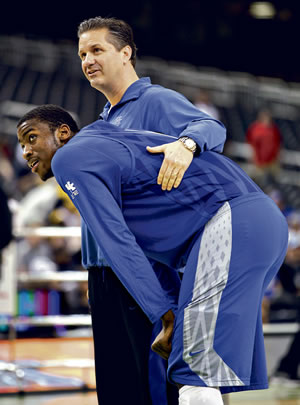Stern’s Rant Is Cranky But Correct

John Calipari has made a career of investing short in talented freshmen such as Michael Kidd-Gilchrist. AP photo
NBA commissioner David Stern isn’t one to let someone less brilliant than himself – meaning everyone – criticize (make a suggestion) that the league has room for improvement.
This became apparent a week ago when Stern took on NCAA president Mark Emmert, who’d said the NBA should increase its minimum draft age past 19, therefore eliminating the six credits and a co-ed university careers of top basketball talent. Stern acted as if Emmert had suggested his amateur rival had accused the commissioner of wearing mismatched socks.
Stern countered with smiling smugness saying it’s the NCAA’s job to clean up its own mess.
While Stern’s snarky response could have been handled with a bit more tact, he is not wrong. As in any business, the NBA needs inventory (players) to produce a product or service (professional basketball) it sells to consumers (fans).
But unlike producers who need markets for their goods, the NCAA is not a supplier but a service provider like the NBA. If Emmert wants players to stay on campus, thereby discontinuing the current state of athletics that makes a mockery of academics, the NCAA needs to mandate that anyone who signs of letter of intent must commit to two full academic years on campus. Players who leave early and sign professional sports contracts would be required to refund the cost of tuition.
To make things fair, the NCAA would eliminate the one-year renewable scholarships in favor of guaranteed four-year contracts, and players would have (almost) the same right to movement as coaches. After two years on campus, the player would be free to transfer to another school without impunity.
One of the problems standing in the way of such a brilliant and simple plan is the fear that the top players will simply bypass college and go straight to the NBA Development League or Europe for a season.
Go for it. There are more than 3,600 male athletes playing Division 1 basketball. The effect of losing 10 during any year would be negligible.
For all of Stern’s proclamations of disinterest, “We don’t think it’s appropriate for us to lecture kids as to whether they should or shouldn’t go to school,” nothing would make the genius-in-chief happier than to see universities fund more of the training costs for future NBA employees. “For our business purposes, the longer we can get to look at young men playing against first-rate competition, that’s a good thing. Because draft picks are very valuable things,” he said.
So, if they are both in agreement, why all the hostility and lack of action? Stern got enough heat for his sideline dress code and doesn’t want to be seen as being unfriendly to labor. Emmert has bigger problems – convincing university presidents that booster support and television income will stick around longer than a John Calipari recruit.
One note on Big John. To many, Calipari may seem to epitomize all that is wrong with college athletics. But he’s just doing what every other coach in the country would if they could.
Does that make it right? No. But you don’t cure a disease by treating the symptom.





